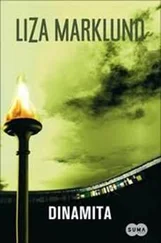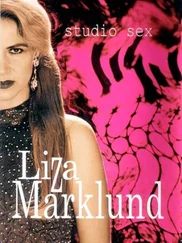It was done, the spy is here, about to go through the bins and the post-box.
The man picked up a phone and pressed some buttons.
‘Take a seat and I’ll call the registrar.’
She went over to the waiting area, three curved brick-red sofas, one EU flag and one Swedish flag, a designer rack holding a mass of magazines, a metal statue possibly supposed to be a small child. Maybe a girl.
She looked at the statue; was it bronze?
She took a step closer. Who was the girl? How many inquisitive spies had she watched come and go?
‘Hello? Did you want to look through the minister’s register?’
She glanced up and found herself looking at a middle-aged man with a ponytail and sideburns.
‘Yes,’ Annika said. ‘That’s me.’
She held out her hand, not mentioning her name. According to the freedom of information laws, you could check public documents without having to prove your identity, a law she was happy to safeguard as often as she had the chance. At least it saved her from having to feel the slightest shame, because they didn’t know who she was.
‘This way.’
They passed two locked doors and a passageway painted in diagonal stripes, and took the lift up to the sixth floor.
‘To your right,’ the man said.
The marble floor was replaced by linoleum.
‘Down the steps.’
Worn oak tiles.
‘This is my room. So, what did you want to see?’
‘Everything,’ Annika said, taking off her jacket and deciding to get as much spying done as possible. She put her coat and bag on a chair in the corner.
‘Okay,’ the man said, starting up a program on the computer. ‘Karina has had six hundred and sixty-eight official items since she started as a minister almost ten years ago. I’ve got the whole list on here.’
‘Can I have a printout?’
‘This year?’
‘Everything.’
The registrar’s expression didn’t change, he just started his printer.
She glanced down the first page of the printout: registration date, item number, in date, documentation date. Then the name of the person who had been in charge of the item, the person who had sent it, name and address, a description of the item in question, and finally what it led to.
Decision, she read, ad acta.
‘What does “ad acta” mean?’ she asked.
‘No reply,’ the man with the ponytail said, turning to face her. ‘Archived without action. Could have been an encouraging note, or a rambling letter from one of our more regular correspondents.’
She went through the descriptions of the items: an invitation to the Cannes Film Festival, a request for a signed photograph, a plea to save a publishing company from closure, five questions from class 8B in Sigtuna, an invitation to the Nobel dinner in Stockholm City Hall on 10 December.
‘Where are all these letters and emails physically stored?’
‘The items you’re reading through now are still current, so they’re with secretaries.’
She took the second page and her eye was caught by the first item.
Statement from the Newspaper Publishers’ Association regarding changes to broadcast rights for digital television.
Anne Snapphane’s channel , she thought.
‘Could I look at this one?’
The registrar stretched his back, looked at the printout she was holding out, and adjusted his glasses.
‘You’ll have to contact the person dealing with that,’ he said and pointed at the name below the document date.
She moved on, there were periods of heavy correspondence regarding proposed legislation.
She reached a printout of items received very recently.
Registration date: 18 November.
Sender: Herman Wennergren.
Regarding: Request for meeting to discuss a matter of urgency.
‘What’s this?’ Annika asked, handing the man the sheet.
He read silently for a moment.
‘An email,’ he said. ‘Received Tuesday evening, registered yesterday.’
‘I want to know what was in that email,’ she said.
He shrugged. ‘I can’t help with that; it’s with the person who’s dealing with it. Anything else?’
She turned away, continued to look through the list, oddly agitated.
Why would the Evening Post ’s chairman suddenly decide that he had to meet the Minister of Culture on Tuesday afternoon?
She forced her worries to one side.
Sender: Anonymous.
Regarding: Drawing of yellow dragon.
Decision: Ad acta.
She read the entry again.
‘What’s this?’ she said, leaning forward and pointing, waiting for the man to put on his glasses and look.
‘An anonymous letter,’ he said. ‘We get quite a few of those. Mostly newspaper cuttings or slightly muddled opinions.’
‘Many yellow dragons?’
He laughed. ‘Not too many.’
‘Where are the anonymous letters?’
‘I collect those here, they have their own box.’
The registrar took off his glasses and reached for a brown file labelled Government Offices: Anonymous Post . He opened it and took out the letter at the top.
‘We keep them in boxes arranged by year, five years up here and then they go into the central archive. Every envelope is stamped on the back.’
He held out the little envelope, letting her read it. It was stamped 31 October that year.
‘What’s in it?’
‘I think this one’s the dragon.’
He pulled out a sheet of A4 paper folded in four, smoothed it out and handed it to Annika.
‘I don’t know why they sent it here,’ he said, ‘but maybe it counts as culture.’
It really was a little dragon in the middle of the sheet of white paper, drawn with a rather shaky hand and coloured with yellow ink. Something clicked inside Annika’s head. She felt it physically. She had seen a dragon almost exactly the same as this recently, but where?
‘Can I have a copy of this?’ she asked.
While the man went out into the corridor to get a photocopy, Annika picked up the envelope the dragon had arrived inside. It was addressed to Minister of Culture Karina Björnlund, Stockholm, La Suède.
She looked closer at the stamp. Postmarked in Paris, le 28 Octobre.
Ragnwald had probably lived in the French part of the Pyrenees for the past thirty years. There could be a connection, but where had she seen the drawing before? She closed her eyes tight and searched her memory, catching a glimpse of something.
She opened her eyes wide, listening out for the registrar. She could hear him talking to someone down the corridor. She looked round the room and discovered a little Post-it note stuck to the bottom of his computer screen. She crept over to the computer and leaned over to read the note.
Karina direct , then a number through the departmental exchange, then the word mobile followed by a GSM number.
She stared at the number, 666 66 60. Twice the number of the beast, and then a zero. Was that just coincidence, or did it say something about Karina Björnlund?
‘Anything else I can help you with?’
Annika jumped and straightened up, turned round and smiled disarmingly.
‘Maybe another time,’ Annika said, picking up the sheaf of printouts, ten years of incoming post to the Minister of Culture.
She headed for the lifts with relief.
Mehmet filled Anne Snapphane’s office doorway, anger radiating from his head. Anne’s reflex reaction at the sight of him was pure, uncomplicated joy, a blinding white jubilation that shot up from her stomach all the way to her scalp.
‘We’ve got to sort this out,’ he said. ‘Now, before it gets so infected that we can never get to grips with it.’
Her happiness didn’t want to go; it clung on as a fading hymn of praise: He came! He came here to me! I’m important to him.
Читать дальше












